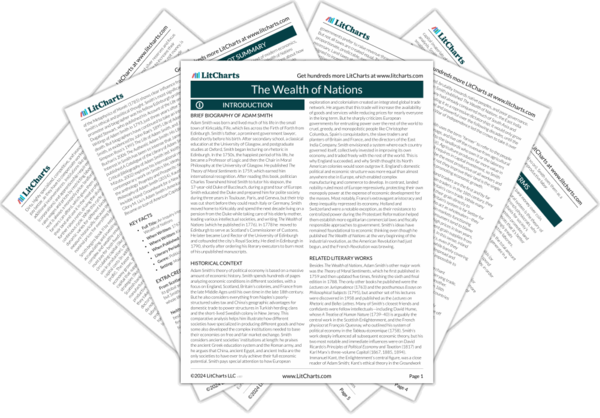Profit Quotes in The Wealth of Nations
As the price or exchangeable value of every particular commodity, taken separately, resolves itself into some one or other, or all of those three parts [wages, profits, and rent]; so that of all the commodities which compose the whole annual produce of the labour of every country, taken complexly, must resolve itself into the same three parts, and be parcelled out among different inhabitants of the country, either as the wages of their labour, the profits of their stock, or the rent of their land. The whole of what is annually either collected or produced by the labour of every society, or, what comes to the same thing, the whole price of it, is in this manner originally distributed among some of its different members. Wages, profit, and rent, are the three original sources of all revenue, as well as of all exchangeable value. All other revenue is ultimately derived from some one or other of these.
Rent, it is to be observed, therefore, enters into the composition of the price of commodities in a different way from wages and profit. High or low wages and profit are the causes of high or low price; high or low rent is the effect of it. It is because high or low wages and profit must be paid, in order to bring a particular commodity to market, that its price is high or low. But it is because its price is high or low, a great deal more, or very little more, or no more, than what is sufficient to pay those wages and profit, that it affords a high rent, or a low rent, or no rent at all.
To widen the market, and to narrow the competition, is always the interest of the dealers. To widen the market may frequently be agreeable enough to the interest of the public; but to narrow the competition must always be against it, and can only serve to enable the dealers, by raising their profits above what they naturally would be, to levy, for their own benefit, an absurd tax upon the rest of their fellow-citizens. The proposal of any new law or regulation of commerce which comes from this order, ought always to be listened to with great precaution, and ought never to be adopted till after having been long and carefully examined [...]. It comes from an order of men, whose interest is never exactly the same with that of the public, who have generally an interest to deceive and even to oppress the public, and who accordingly have, upon many occasions, both deceived and oppressed it.
No equal capital puts into motion a greater quantity of productive labour than that of the farmer. Not only his labouring servants, but his labouring cattle, are productive labourers. In agriculture, too, Nature labours along with man; and though her labour costs no expense, its produce has its value, as well as that of the most expensive workmen. [...] The labourers and labouring cattle, therefore, employed in agriculture, not only occasion, like the workmen in manufactures, the reproduction of a value equal to their own consumption, or to the capital which employs them, together with its owner’s profits, but of a much greater value. Over and above the capital of the farmer, and all its profits, they regularly occasion the reproduction of the rent of the landlord. This rent may be considered as the produce of those powers of Nature, the use of which the landlord lends to the farmer.












